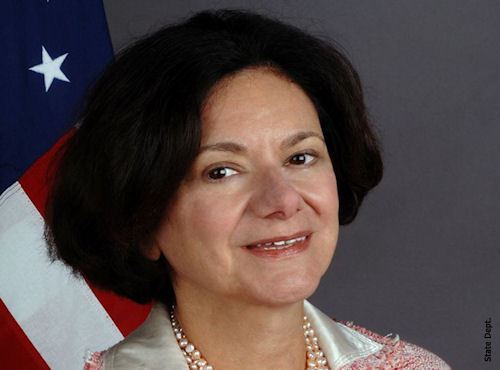
Ambassador Rosemary DiCarlo vs the YPU
By Kathryn Ward
Tuesday night, the Yale Political Union filled Sheffield Sterling Strathcona hall in a mix of suits and sweatshirts to hiss, clap, and cheer the UN’s Responsibility to Protect resolution, adopted in 2005, which refutes absolute sovereignty in cases of genocide, ethnic cleansing, and crimes against humanity. Former US Ambassador to the UN Rosemary DiCarlo rose to its defense, and used her decades of political service to argue that the current state of the world necessitates emergency means of last resort to resolve extreme violence by states against their peoples.
The 2005 World Summit adopted in its final resolution document two paragraphs, 138-139, which have since been deemed “Right to Protect.” The UN stated, “Sovereignty no longer exclusively protects States from foreign interference; it is a charge of responsibility that holds States accountable for the welfare of their people.” The decades of genocide from Bosnia to Rwanda had catastrophically illustrated the failure of the UN to fulfill its promises of a better world following World War II, and Right to Protect was seen as the creation of a final option of international intervention if internal violence crossed into atrocity.
Foreign military offense was described as the last resort by current UN Secretary-General Ban Ki-Moon in 2009, where existing domestic and international justice alongside foreign humanitarian aid precedes the drastic situation necessary to invoke Right to Protect. However, critics of the statute argue Right to Protect can easily become a method of unjust military action without the approval of the UN Security Council, and a way for military powers to circumvent international law to their own benefit.
Ambassador DiCarlo responded in her speech that the UN system was anachronistic to intrastate warfare. The global events of World War II and before were largely conflicts between states, but the post-war world was scarred by violence by states against their own peoples. The UN’s charter focused on guaranteeing a state’s sovereignty, but had limited options for protecting the people within when the state targeted them. In particular, the UN charter explicitly prohibited UN intervention in matters of “essential jurisdiction to states,” which includes the justice system.
The failure of both internal and external justice, however, to handle or prevent the tragedies of the fifty years following the charter’s inception proved its insufficiency. DiCarlo poignantly reminded the audience of how the beginnings of the UN were rooted in a horrified promise of ‘Never Again’ in response to the Holocaust, but, in the Ambassadors words, “again, and again,” violence claimed the lives of hundreds of thousands of innocents while the UN did not act. In particular, the Bosnian War was a wake up call to the international community to the still-existing terror of ethnic cleansing, and ten years later, Right to Protect was passed.
Impassioned students from both sides of the aisle argued following DiCarlo’s speech, both for and against Right to Protect. The most compelling opponents questioned the determination of legitimate action, with one debater painting the resolution as “dogmatically pro-military.” The opposition portrayed Right to Protect as an illegal method of skirting the purpose of the UN- that of collective, rational decisions between states. They saw it as as redundant if the UN charter was fully carried out. Furthermore, opposition debaters questioned the legitimacy of Right to Protect when only small, defenseless states would be targeted, giving the example of the international silence on powerful countries such as Saudi Arabia’s human rights abuses. From the opposition viewpoint, Right to Protect is an excuse for militant countries such as Russia or the US to skirt the UN Security Council.
Student proponents of Right to Protect, who came from the more liberal political parties in attendance, demanded the recognition of human life above political jargon, claiming “sovereignty does not exist in a vacuum.” They, like Ambassador DiCarlo, pointed to the insufficiency of UN action to prevent genocides in the past as reason enough for a new method of intervention.
Overall, the long debate prompted discussion that mirrored similar discussions over Right to Protect’s justification. Ambassador DiCarlo was well received by the audience, even to those who disagreed with her argument in its entirety. Alexandra Small, SM ’18, commented that the ambassador was “idealistic…but compelling.” The YPU’s mission statement is to engage and challenge prominent leaders today, and both Ambassador DiCarlo and students in attendance rose to that call.